Exhaust fan in the bathroom: how to choose the right + installation rules
Providing a comfortable microclimate of the bathroom and shower room can be problematic. The increased level of humidity adversely affects cabinets, mirrors and cabinets, contributing to the growth of mold.
If natural ventilation can not cope, then you can put a fan for extracting in the bathroom - the unit forcibly removes the exhaust moist air from the room.
We will tell you how to choose the right model, and also describe the installation process step by step. The installation technology is quite simple, the main thing is to take into account some of the nuances of the connection and follow the instructions below.
The content of the article:
Do I need a fan in the bathroom?
The opinion that manufacturers came up with a bathroom fan to cash in on consumers is not true. After all, living conditions in different houses are radically different. AND bathroom ventilation system not always satisfying needs.
The requests of the residents of the house / apartment vary - someone erases the laundry in the bathroom, likes to bathe for 1-1.5 hours, and someone just takes a 5-minute contrast shower.
All this in conditions of inoperative ventilation is fraught with the appearance of mustiness and other unpleasant surprises in the monastery of purity, for example, the appearance of black mold.

Installing a fan will be a salvation for many bathrooms in high-rise buildings and private houses of a modern building with hermetic windows and insulated walls.
A good decision would be to install a fan if the toilet and bath are in the same room. A range hood will add comfort to the life of all apartment residents who are forced to use the combined bathroom.

If the general ventilation works well and excellent draft is observed in the bathroom, and the walls of the room dry out quickly after bathing, then you can safely forget about the fan.
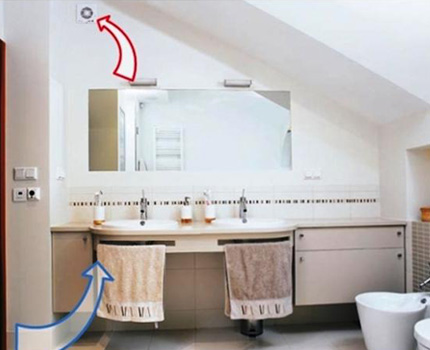
The natural inflow and removal of exhaust air is able to fully satisfy the needs of consumers.
How not to miscalculate with a choice?
If you want to buy a fan, the inexperienced owner of the house / apartment can easily get lost among the variety of these appliances.
They all differ visually and in value. The biggest mistake is to choose equipment based on the price that seems most acceptable.
Types of fans and their features
The question of the need for a fan is always solved individually. If you need a device, you have to choose the optimal model that can perform its functions of removing exhaust air from the bathroom / shower.
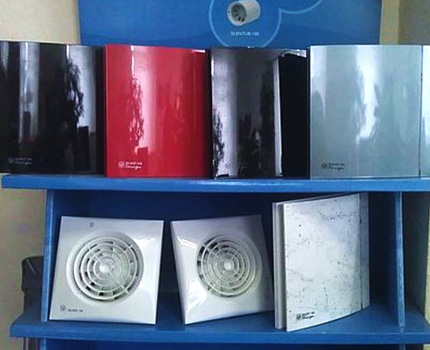
By the method of fastening there are:
- waybillsmounted at the entrance to the ventilation duct;
- channelinstalled inside the ducts.
For private use, invoices are used - they are easy to install and are quite capable of meeting the needs of all residents of a country house / cottage. If the house has an extensive network of ducts, then installation will be justified duct fans.
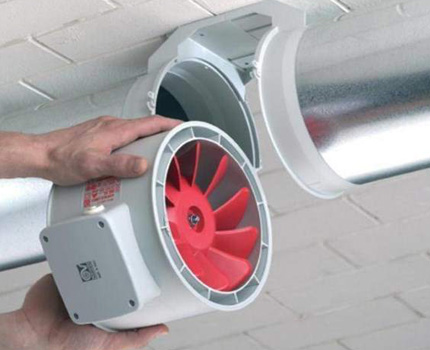
Depending on the location, such devices are distinguished:
- Wall mounted. They are mounted horizontally - on the wall;
- Ceilinginstalled in a vertical plane.
In private houses, mainly ceiling ventilation devices are installed, which remove the exhaust air first to the non-residential attic, then to the street.
Also, there are lobed and bladeless fans, axial and centrifugal models. The former are most often bought for organizing forced ventilation of the bathroom and shower rooms.
These devices differ not only in appearance, but also in their capabilities. Depending on the skills of the fan, the price differs significantly.
The range is represented by fans from European and domestic manufacturers - Spanish SILENT, italian Elicent, Bulgarian Mmotors JSCRussian "Era", Ukrainian Vents.
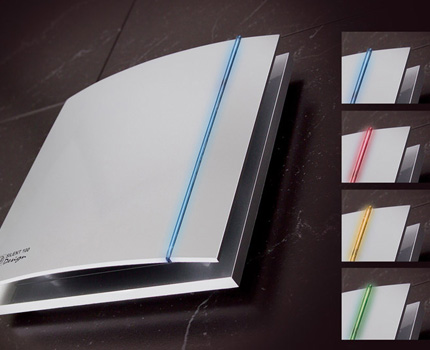
Among the features of bathroom fans, the most popular models are those with a temperature and humidity sensor, a timer, a separate power button, safety shutters and a non-return valve.
Another find is an additional decorative panel that allows you to create a unique look of the device, emphasizing the elegant design of the room.
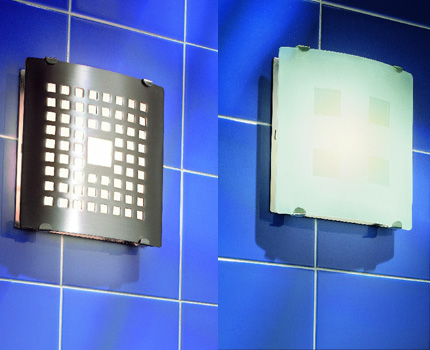
Rules for choosing a good hood
In order for the device to cope with its obligations to remove exhaust air and please its users, you need to choose the right model. For this it is important to take into account the important parameters of the future fan, which are crucial for the choice of the final option.
Fan power. The indicator is selected based on the volume of the bathroom / shower room and the diameter of the hole on which the fan will be placed. This is 100, 125 mm and others.
To determine the power, you can use the regulatory requirements, according to which in premises of this type it is necessary to provide air renewal at the level of 3-8 times per hour.
In practice, it turns out that you need the length of the room * by width * by the height of the ceilings * by a factor (from 3 to 8). To the resulting number you need to add 20% - this is a small margin that ensures the free operation of the device.
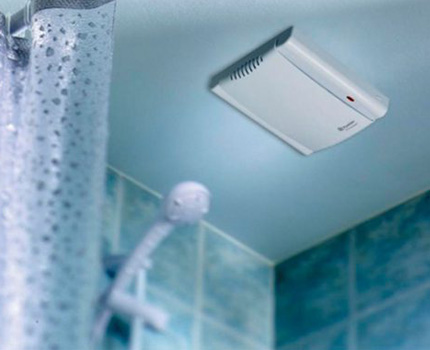
Equipment safety. This is an important criterion, because it will be installed in a room with a high level of humidity. And accidental splashing cannot be ruled out. Pay attention to moisture protection level.
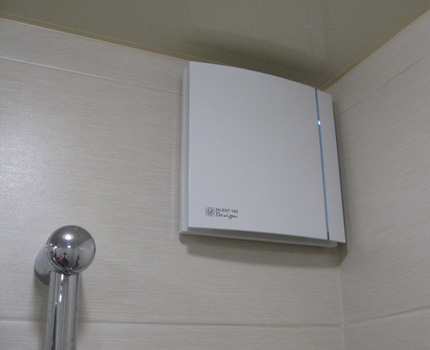
Fan noise. The most acceptable option is up to 35 dB. The lower this indicator, the more comfortable all family members who use a bath or shower with an installed ventilation device will feel.
If the fan noise is 40 dB or higher, this can disrupt the quiet sleep of especially sensitive households and cause a headache when staying in a ventilated room for a long time.
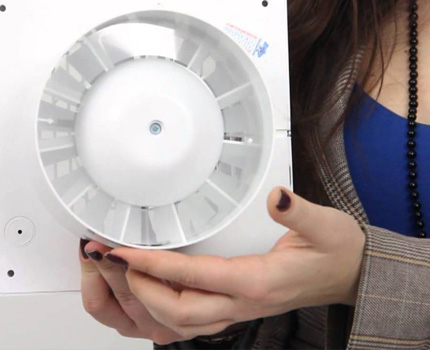
Easy installation and maintenance. Well, if the appropriate option can be installed with your own hands, without calling experienced craftsmen. And ease of maintenance matters - the simpler and less frequent, the more preferable.
Additional functionality. It is convenient if the fan is equipped with a timer, decorative lighting, protective curtains or a humidity sensor. High-tech models can be controlled via SMS.

Cost. No matter how much you want to get the best model, its price always stops. It is on this parameter that the final choice of the consumer depends - someone will focus on Spanish SILENT, and someone will prefer more affordable domestic devices.
Appearance. It is the design of the equipment that is appreciated by many consumers who carefully study the interior of their home. The device should organically fit or add a twist to the created style solution of a particular room.
Additional selection recommendations and an overview of the best models of exhaust fans are given in this article.
Controversial issues in the selection of equipment
When choosing a fan for bath / shower, you can observe a lot of controversy over additional functions between the owners of the device.
Check valve. You can hear categorically opposing opinions about the necessity / uselessness of this element. It is needed so that the air does not come back.
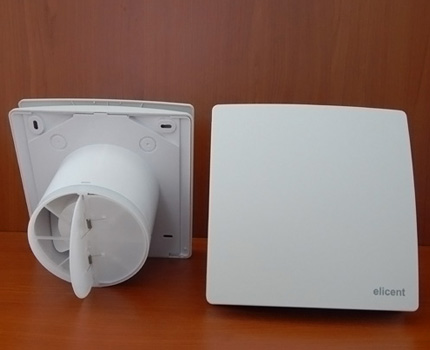
For example, if neighbors fry fish / potatoes, then with the fan turned off, the valve closes and prevents air with the aromas of the neighbor's dinner from entering the apartment. If the door to the bathroom is tight, then you can refuse to purchase check valve models.
This is very individual, because many masters, setting the doors to the bathroom, take into account regulatory requirements and leave a gap from the bottom edge to the floor of 1-2 cm.
Another unpleasant phenomenon is that these valves become clogged and can stick to the fan. They require cleaning and care. Every 6 months you need to remove the fan and brush the check valve petals.
Blinds / Protective Lattices. Often you can hear the opinion that it is advisable to take a model without them. Blinds are needed to close the hole if necessary with one easy movement. This is justified when used by people who like to steam and prone to colds.
When there is no special need for such a function, the permanently closed grille will entail the appearance of stale air in the room, when the fresh cannot be reached, and the exhaust can be difficult to leave.
Safety net. It is needed to prevent cockroaches, butterflies and other unwanted guests from getting from the ventilation duct.
On the other hand, the grid is electrified, dust settles on it and a web accumulates. Therefore, it is often necessary to clean it - every week or two. To put a protective mesh or not depends entirely on the specific conditions of the bathroom.
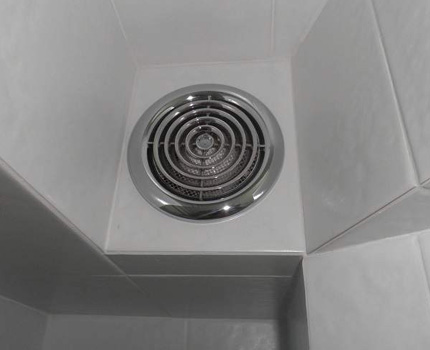
Decorative panelcompletely covering the direct airflow to the fan. It really affects the performance of the equipment. This point should be considered when choosing a model for your bathroom.
When I liked 2 options that differ in power, noise and price, you can hear advice that you need to take more powerful one. This is wrong - the power should clearly correspond to the room's needs for air renewal.
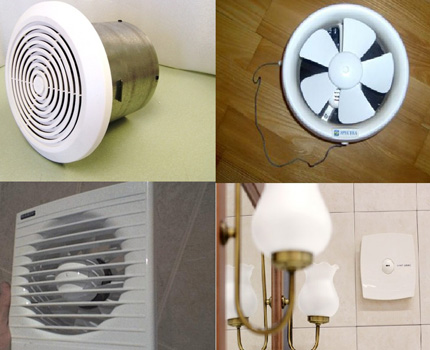
Features of mounting an exhaust fan
You can improve the microclimate of the bathroom with the help of an exhaust fan on your own or with the help of craftsmen. The installation option of the ventilation device depends on the complexity of the model purchased and the skills of the owner of the apartment / house.
If the fan is easy to install and there is a desire to do it yourself, then all the work will take about 2 hours with drilling the walls.
The process of installing and connecting the fan to the exhaust outlet in the bathroom includes a number of traditional steps:
Where to start the installation?
It is desirable to install the exhaust device in the hole prepared in advance for it. This is done at the construction / repair stage.
The conditions and technical characteristics of the ventilation duct of a particular bath / shower depend on the type of house, the year of its construction and project. If we are talking about multi-unit housing, then there are ventilation ducts that are in working or completely inoperative state.
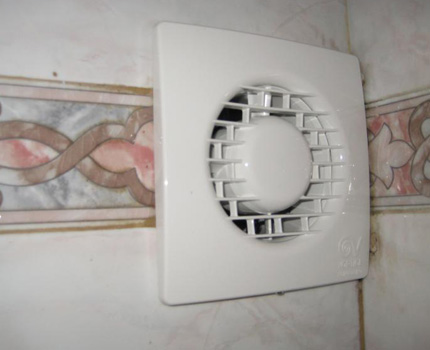
You need to start the installation with the correct preparation of the channel. To do this, the work that is needed in each specific case is carried out - it can be making holes in the tile for access to the ventilation duct or, conversely, adjusting the square section of the inlet to the diameter of the exhaust fan bell.
The ventilation duct can be significantly larger than the fan. But this does not matter - a special pipe for installation is often supplied with the device or a more rigid sewer can be used. It is placed in the ventilation duct, and the hole around is blown with foam.
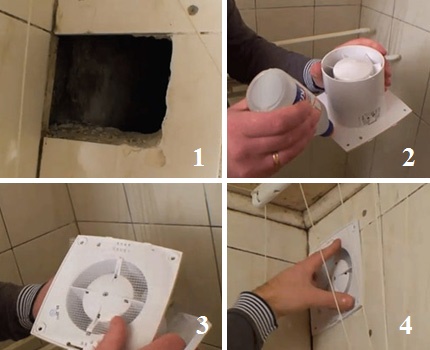
If the craftsmen laid the tiles, then it is necessary to mark the diameter of the hole for the fan. You can look in the documentation or simply lean the device against the back and draw a pencil around the outline of its bell. Now you have to make a hole in the tile.
Also, a power cable for connecting the fan must be connected. Ideally, it lies under the tile in the place where the device was originally planned to be installed. If this was not done in advance, then it is necessary to lay it separately on top of the tile, using a special box to protect against splashes.
Features and nuances of installation
Depending on the shape of the fan, the initial parameters of the ventilation duct and the option for fresh air to enter the room, there may be some nuances of the installation.
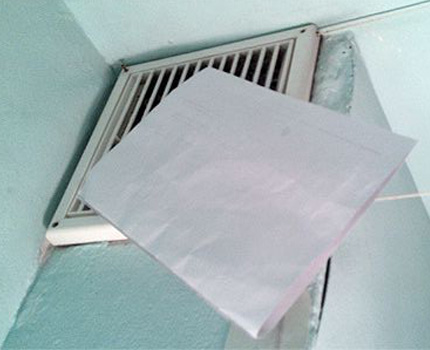
Air will smoothly bypass the fan and get a good stream of air. Feet for the fan can be cut out of foam, which can simultaneously perform the function of depreciation.
If the size of the inlet to the ventilation duct was adjusted to fit the fan bell, then when the mounting foam dries, a couple of the most common rubber bands can be put on the fan bell, as is used in cash desks.
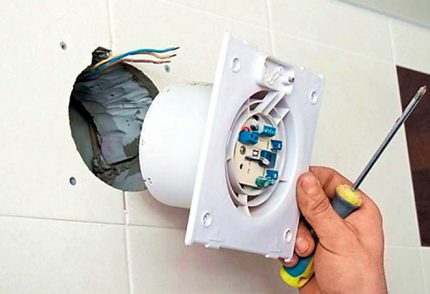
This method of fixing will allow you to get a fan if necessary and remove without effort to clean everything. The gum itself plays the role of a gasket, and is able to dampen vibrations during operation of the device. Another plus - you do not have to drill holes in the wall for mounting.
For large diameter vents, a dual ventilation grill can be used.This is relevant when exhaust air enters the ventilation duct with the fan running through the upper part, and free inflow through the lower part.
Direct installation of equipment
When the preparation for installing the exhaust device in the bathroom / shower room is completed and the place for the fan is provided and marked out, you can start the installation. First you need to remove the upper part of the fan - a decorative panel or grille.
Depending on the chosen mounting option, it is necessary to securely fix the fan.
The most common options are:
- drill holes in the wall;
- put the fan on liquid nails / glue;
- use 2 gum.
The most correct option is to drill holes for fastening by trying on a fan. Here, before drilling, you need to carefully level the device in level. First, drill the tile using a special feather with a drill or a hammer drill with a drill. Then, punch a hole for the dowel.
Under the wire you need to make a groove or a special hole. The fan itself has a hole for the wires. You need to install the fan in place and pull the wire to the surface.
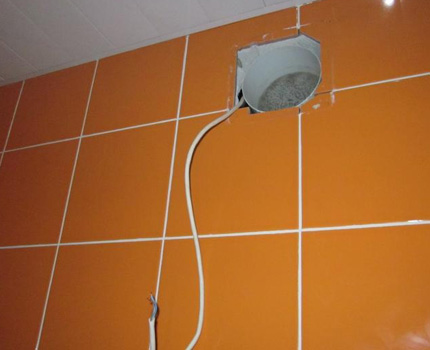
It remains to fix with screws or other screws. For this, it is convenient to use a screwdriver or screwdriver.
Now you need to connect the power cable to the fan contacts. For this, the manufacturer's instructions come in handy. Now you need to replace the mesh and the protective grill.
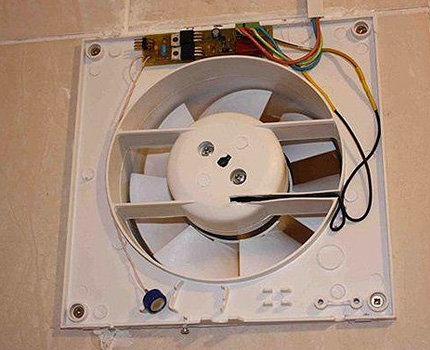
It remains to turn on the fan and check the operation. Moreover, it is most convenient to provide for the location of the switch in the bathroom / shower, and not outside. And it is not advisable to connect an exhaust fan to a light switch - if you have to wash and brush your teeth, then turning on the device is not required.
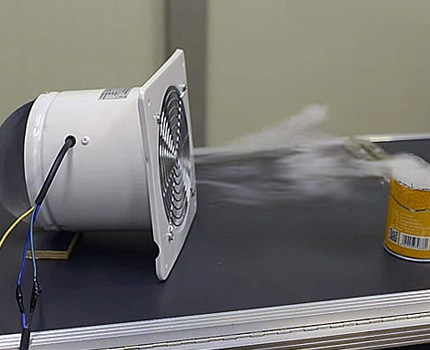
The procedure for connecting the hood to a switch or timer model is described here.
Conclusions and useful video on the topic
Video clip about the organization of bathroom ventilation and the intricacies of installing a fan:
The video tells in detail how to properly install an exhaust fan in the bathroom if you have to drill a newly laid tile on the walls:
Install a fan in a simpler way. How to do this is shown step by step in the video clip:
How to choose a fan for the bathroom, if the bathroom has a sealed door, is described in detail in the video:
Having familiarized yourself with the features of choosing a fan for the bathroom, you can choose the most suitable option, suitable for the characteristics and cost.
Installation of the device can be done independently. To do this, you need to familiarize yourself with the installation and connection of the device. If such work raises doubts in one's own strengths, then it is better to invite a professional.
If you have experience installing and using an exhaust fan in a bathroom, please share this information with our readers. Leave comments and ask questions in the form below.

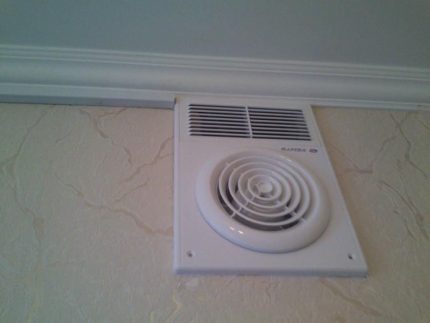
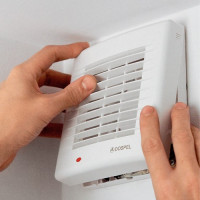 How to choose and install a fan in the bathroom + how to connect a fan to a switch
How to choose and install a fan in the bathroom + how to connect a fan to a switch 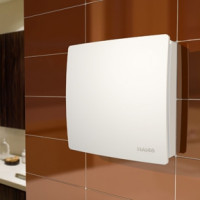 Hood to the bathroom: selection rules and installation features
Hood to the bathroom: selection rules and installation features 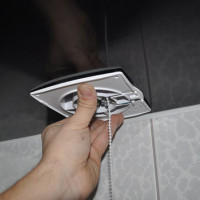 Suspended ceiling fan: features of selection and subtleties of self-installation
Suspended ceiling fan: features of selection and subtleties of self-installation 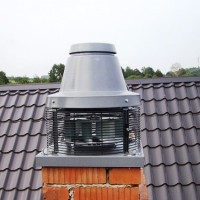 Chimney fan for improved draft: types of devices and insertion instructions
Chimney fan for improved draft: types of devices and insertion instructions 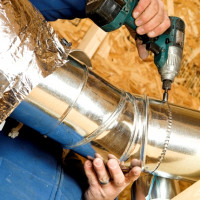 How to make ventilation in the country: subtleties and rules for installing ventilation of a country house
How to make ventilation in the country: subtleties and rules for installing ventilation of a country house 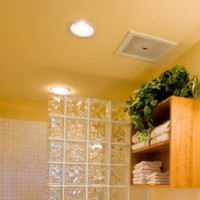 Ventilation in the bathroom in the ceiling: arrangement features + installation instructions for the fan
Ventilation in the bathroom in the ceiling: arrangement features + installation instructions for the fan 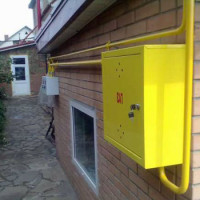 How much does it cost to connect gas to a private house: the price of organizing gas supply
How much does it cost to connect gas to a private house: the price of organizing gas supply  The best washing machines with dryer: model rating and customer tips
The best washing machines with dryer: model rating and customer tips  What is the color temperature of light and the nuances of choosing the temperature of the lamps to suit your needs
What is the color temperature of light and the nuances of choosing the temperature of the lamps to suit your needs 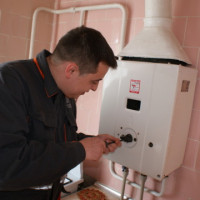 Replacement of a geyser in an apartment: replacement paperwork + basic norms and requirements
Replacement of a geyser in an apartment: replacement paperwork + basic norms and requirements
Good ventilation is very important for the bathroom. A moist, well-heated room is an ideal environment for the development of mold and various kinds of microorganisms. Regular ventilation significantly reduces humidity and eliminates the smell of dampness. Therefore, it is very advisable to install at least the simplest exhaust fan. This is done simply, and is quite inexpensive.
I was faced with the problem of mold in the bathroom after the repair and installation of a sealed window. It turned out that the bathroom was poorly ventilated. I decided to install an invoice exhaust fan at the entrance to the ventilation duct. After that, the condensate on the tile stopped collecting. When choosing a fan, you need to take it with a power reserve of 20%, so that you can quickly ventilate the bathroom and without much load.